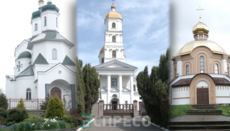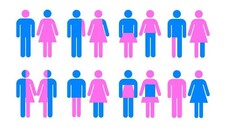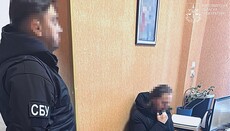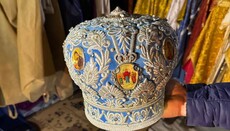Greek hierarch – to Council: Recognising OCU will lead to Orthodox split

Metropolitan Simeon of New Smyrna in a letter to the hierarchs of the Church of Greece said why hasty decisions should ve avoided regarding the “Ukrainian issue”.
Metropolitan Simeon (Koutsis) of New Smyrna addressed the Primate of the Orthodox Greek Church, Archbishop Ieronymos, and members of the Holy Council and Synod with a letter in which he spoke about his position on the “Ukrainian issue”. The full text of the letter was published by the Greek edition Romfea.
Metropolitan Simeon says that the reason that prompted him to write a letter is the decision of Archbishop Ieronymos to raise the so-called “Ukrainian issue” during the Synod, which was not previously included in the agenda.
His Eminence emphasized that the current situation in the Orthodox Church in light of the Ukrainian problem aroused “deep regret and great anguish” in his soul.
In particular, the point is that "the Russian Church and the Patriarchate of Constantinople are in a state of unprecedented dispute over the administration of the Church."
He recalled that "the Russian Church has ceased ecclesiastic and Eucharistic communion with the Ecumenical Patriarchate and is taking actions that impede church unity and respect for its (the Patriarchate of Constantinople – Ed.) ecclesiastic and canonical space."
Metropolitan Simeon affirms that such a situation, though not yet a schism of the Church, "opens the door to a schism". He emphasized that "other Orthodox Churches, the ancient Patriarchates and Primates of the Churches have already expressed their attitude to this problem."
In turn, the Metropolitan writes "he was deeply concerned about this whole situation, since it disadvantages the Orthodox Church as it is in the eyes of Orthodox Christians and the entire world."
He emphasizes that at the moment there is a danger that ethnophyletic criteria threaten to occupy a dominant position in the Church, which may lead to the emergence of two “blocks”: Greek-speaking and Slavic-speaking. Such a state of affairs, according to Vladyka, "violates our Orthodox church relations, which is visible even with a naked eye".
Metropolitan Simeon noted that he does not specifically want to indulge in the historical and canonical consideration of the issue of “Ukrainian autocephaly,” because he admits the existence of various interpretations of the canons of the Church.
However, he calls to bear in mind that “we do not live in the 4th century”: “Church structures now are not the same ones that once existed around the Mediterranean basin and a little further. Entire continents have been open ever since. The Church has its presence all over the world. There is no longer Judaism and nationalism. Around us major changes are undergoing. Can we just ignore them?” he argues.
At the same time, Metropolitan Simeon recalled that "Ukrainian autocephaly and the conditions in which it was granted have nothing to do with any other cases of autocephaly previously granted by our Ecumenical Patriarchate."
He especially underscores that all “previous requests for autocephaly were made by the canonical Local Churches of the new states, and the Churches, for the most part, supported secular institutions.”
In turn, "the recognition (without expressed repentance) of Ukrainian schismatics, bypassing not only the canonical Ukrainian Local Church, but also the Moscow Patriarchate raises many questions and the relevant reaction."
Metropolitan Simeon reminds the Greek synodals and bishops that “unfortunately, we are losing sight of the fact that at this time, in one city we have two Kiev metropolitans and two parallel local churches. However, neither Kiev nor Ukraine as a whole are divided but constitute a single national entity.”
According to the hierarch, "Ukraine is a country where there is a confrontation of geopolitical aspirations." However, he says, “we, the responsible pastors of the Church, must in the first line fight for the unity of the Church of Christ so that we can be one with all.”
His Eminence writes that the gift of "autocephaly" was supposed to eliminate the split in Ukraine and contribute to the church cohesion among all Orthodox countries; however, "as the developments show, this was not achieved at all".
In addition, numerous cases were noted, including from the former president of the country Poroshenko, “of accusations, lynching and abuse directed against parishioners and parishes of the (canonical) Church”.
Moreover, he recalled that the new church structure, which received autocephaly, did not function correctly from the very beginning, which is why “’honorary patriarch’ Filaret quit it to organize a parallel structure, while his (Filaret’s – Ed.) former bishops pressed solid charges against him.”
Metropolitan Simeon emphasizes that “in my humble opinion, the recognition or non-recognition of a new leader is not a sole responsibility of the Primate or the Synod, but a prerogative of the Council of Bishops (Synod of the Hierarchy – Ed.), since our Church has not a patriarchal but a synodal way of governance.”
According to the hierarch, the “Ukrainian issue” is of crucial importance “and if they choose to overhaul it, then it must be included on the agenda of the next Bishops' Council”.
He calls to make sure that the discussion of this issue is organized hierarchically and that there is an opportunity to listen to different points of view.
The metropolitan stressed that “if this issue is addressed with haste,” this may lead the Church of Greece to serious problems: “it is an error to believe that such an approach to the problem will support the Ecumenical Patriarchate.”
“We need to listen to all parties. All of them, of course, are in a hurry to submit their opinions in writing. However, passion destroys the mind and desperation harms the love of Christ. The Church is indeed a society of love,” says Vladyka.
He recalled that we are all Christians: "Russians, Serbs, Romanians, Greeks, Europeans, Asians, Africans, Americans – we are all members of the Holy Body of Christ, the Church."
The metropolitan writes that “the Church does not belong to us. We belong to the Church for the sake of the Lord. The Lord Jesus Christ is the Head of the Church, not we, no matter what function we seek to fulfill in the Church with God's blessing.”
“The love and care of the Lord for His Church is comparatively higher than ours. That’s why we must pray fervently that the Lord will enlighten our hearts and minds,” says His Eminence.
In addition, Metropolitan Simeon emphasized that the situation at hand with the “’Ukrainian church’ reminds us of the days of 1054.” In this regard, Vladyka asks the synodals to take time to resolve this issue “so that such problems could be prevented”.
His Eminence called on "to take any necessary initiative or action considered as appropriate by the Church for peaceful settlement of this issue."





